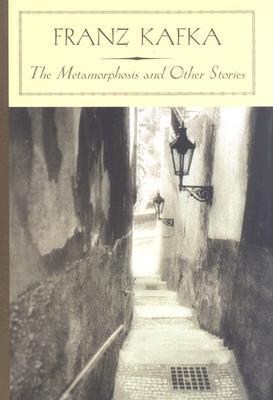My favorite authors to discuss are dead authors, especially “the classics.” There’s something fascinating to me about reading one of the classics, especially for the first time as an adult, in order to form my own opinion. I’m obsessed with that feeling. It’s a strange combination of trust and skepticism, eagerness and dread, pleasure and work. To read something others have deemed great and decide for myself if I agree or disagree – and why. At worst it’s a fantastic way to exercise critical thinking. At best I discover a new master of writing to appreciate. (You can find my other such discussions under the “Not Quite Book Reviews” category tag.)
My most recent adventure was Franz Kafka, the world-renowned nineteenth-century author from Prague, who was a Jewish man writing in German. (English-speakers read translations of his work, obviously. I think this fact alone is daunting and perhaps off-putting to many modern readers, which is a shame.) I picked up a “Barnes & Noble Classics” edition of his collected short stories called Franz Kafka: The Metamorphosis and Other Stories translated by Donna Freed with introduction and notes by Jason Baker.
Kafka’s most famous story is “The Metamorphosis,” a novella in which a young salesman wakes up transformed into a giant roach-like insect. I knew the premise, and I knew that Kafka often dealt with the surreal and the depressing, but I don’t think anything could have prepared me for reading his work. “The Metamorphosis” was a great and fascinating read. It really was. I quickly realized that Kafka has an uncanny talent for blending the surreal/supernatural with the ordinary in such a way that I forgot which was what as I was reading. What seemed impossible to me were characters’ reactions to this bug man, not the bug man himself. It was a really enjoyable sense of unreality and the bizarre. (This is a similar skill to Shirley Jackson, but it’s executed in an entirely different way.)
Unlike Lovecraft, who I found both wonderful and disappointing at the same time, Kafka’s prose is excellent, as is his story structure. He truly is a master. His concepts are unique, but his themes and general tone are usually pretty redundant (though not exhaustingly so). He explores existentialism and futility through complicated and volatile family relationships – usually father/son – and often comments on art/the life of an artist and how that relates to society as a whole. He’s obsessed with failure, and, ironically, I got the impression that his willingness to embrace himself as a failure (both a failed artist and a failed son) is what makes him so accessible despite his difficulty level, and so memorable as a storyteller. In short, he’s depressing as hell, but relatable. He puts his heart out there, and I loved him for it, even when he bummed me out.
“The Metamorphosis” might be Kafka’s most famous story, but by far my favorite in this collection was “A Hunger Artist,” sometimes translated as “A Starvation Artist.” The story is about a man who travels as a type of avant-garde artist who goes on exhibit for willfully starving himself. (Strangely, it reminded me of an episode of Sex & the City where they view almost that exact concept as an art exhibit.) I won’t give the story away, but I will say that I thought it was honestly brilliant. It’s arguably surreal, but it struck me as not only believable but realistic. People are obsessed with “danger acts” and “shock value” entertainment. I can actually imagine this type of thing happening in real life, and that made the story all the more powerful to me. It can be interpreted in many ways, but regardless of what you take away from it, I doubt you’ll be disappointed in the craft of his writing. I highly recommend it.
Some brief thoughts on other stories in this collection. The second story was “The Judgment,” and this was when I realized I’d have to relax my rationale a bit to enjoy Kafka. “The Metamorphosis” was surprisingly coherent to me, but after reading “The Judgment” I had to look up analyses online to make sure I hadn’t missed something. (I hadn’t; it’s surreal and somewhat nonsensical.) I didn’t particularly care for “The Stoker” or “An Old Leaf,” but “In the Penal Colony” was amazing and highly disturbing. “A Country Doctor” eventually won me over on a second read, and “Josephine the Singer, or The Mouse People” had undeniable charm as well as highlighting Kafka’s dark, wry, delightedly twisted sense of humor. “Before the Law” made me incredibly sad, which I guess means it was well done, especially for such a short piece.
I have one other thought after reading Kafka; he’s at least sometimes a horror writer. I think “The Metamorphosis,” “In the Penal Colony,” and “A Hunger Artist” are almost undeniably horror stories (and damn good ones). I say almost undeniably because there are many, many people out there afraid to admit when something good is horror, and Kafka definitely gets the runaround. I’ve already read at least one respected critic who claims Kafka would be a lowly speculative fiction author if it weren’t for his exceptional talent. (Spoiler: he’s still a speculative fiction author; talent doesn’t somehow negate that.) If one more person claims a fabulous story/book/author “doesn’t count as horror” because it’s good I’m going to have to punch someone. Case in point? No one even told me Kafka was a master at horror, or I probably would’ve gotten to him long before now. Luckily I discovered him on my own.
Let’s wrap this up before I descend into full-blow rant territory. Did Kafka change my life? No, but he might’ve changed my writing, and he definitely broadened my reading. Do I think he’s worth the time? Yes, for avid readers and classic literature lovers, though casual leisure readers might be put off by his style. If nothing else, I think everyone should read “The Metamorphosis” to better understand allusions and references in popular culture as well “The Hunger Artist” because I think it’s his best work. He eked into my current top 40 favorite books at number 36.
Have you read any Kafka? What did you think?
Share this:

